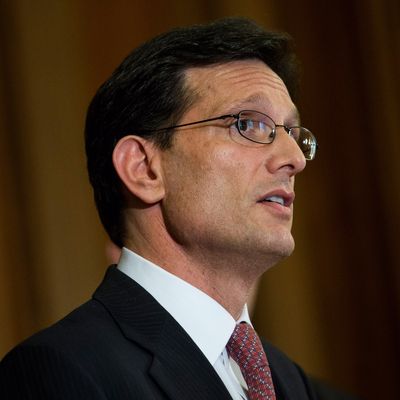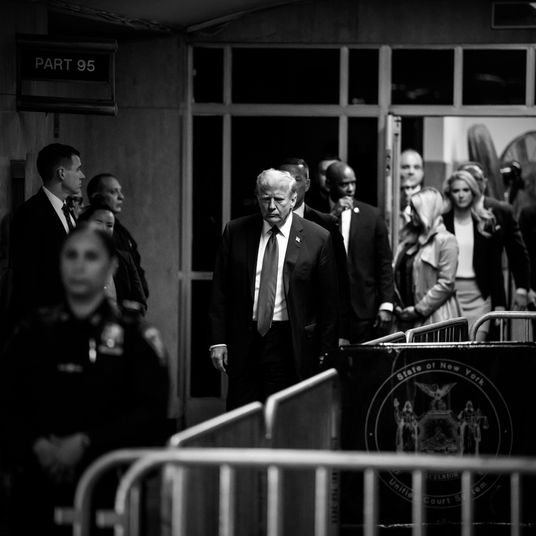
Today brings the utterly unsurprising news that Eric Cantor is headed to Wall Street.
The ousted House majority leader and longtime friend of the financial industry is joining Moelis & Company as a vice-chairman. His paycheck? At least $1.6 million in 2015, plus a million-dollar signing bonus. His duties? To “compete for business and advise corporate and investor clients on takeovers and other deals,” according to The Wall Street Journal. But I get the feeling that won’t be all Cantor will be doing, given his relationships on the Hill and total lack of investment-banking experience.
But how does influence-peddling work in 2014? What do these politicians really do when they end up on Wall Street? To shed some light on those questions, I spoke this morning with Dennis Kelleher. He’s a former corporate lawyer and longtime Senate staffer who now heads the nonprofit Better Markets, the banking lobby’s lonely public-interest opposition in Washington.
You hire an Eric Cantor. What do you expect him to get up to?
“Let’s look at Cantor’s résumé. Let’s look at all his investment-banking experience. Let’s look at his capital-markets experience. He has none. He has no experience or skills that would qualify him to be even an intern at a fifth-tier firm in the financial industry. I mean, come on! I love the spin. They’re pushing back this morning. They’re saying, ‘This is really different! This isn’t like everybody else.’
“But Wall Street always goes with the sure bet and the well-worn path. They’re paying him a guaranteed — you’ve got to love Wall Street, you guarantee money because you can’t fail on Wall Street — they’re guaranteeing him $3.8 million. You don’t guarantee someone $3.8 million because you’re training him to be an investment banker.
“Wall Street is after what it’s always buying in Washington: access, influence, and unfair advantage. And Cantor is a big catch for anybody who wants access. Look, if you’re in congressional leadership for X number of years, you know plenty that’s worth a lot of money. If you’re the majority leader, who’s in charge of the agenda and vote counting? One of your jobs is to make sure you’re doling out favors to people. There are dozens and dozens of House members indebted to Eric Cantor for the things he’s done for them. You’re worth a lot.
“In addition, Eric Cantor knows why some things got done and other things didn’t get done. He knows why someone voted for or against a bill or amendment. He knows how to strategically target everybody in the House on the issues that anybody cares about in a way that’s close to unique. He’s not going to crudely do it in a way that puts the scarlet-L lobbyist on his lapel. He and the rest of the influence peddlers at the highest level of government work the shadows and do indirectly what the law prohibits them from doing directly.”
What does that look like? What are the issues — the legislative and regulatory fronts — that Wall Street is currently trying to shape?
“The list of issues that Wall Street has in Washington is long, deep, and broad.
“They’re going to be fighting everything from tax policy on carried interest, to derivatives, to capital rules, to making sure the [Commodity Futures Trading Commission] is never properly funded, to making sure that the biggest deregulation bill since the repeal of Glass-Steagall, the mislabeled ‘Jobs Act,’ is put in place.
“You could go on and on and on.”
And Cantor has a long reputation as being friendly to Wall Street…
“He was consistently referred to as Wall Street’s go-to guy. There were few people more important both to Wall Street and to Congress as Eric Cantor. He was the number two in the House!
“It’s not only about working in the shadows to get Wall Street’s business done in the policy arena. It’s directing Wall Street cash to the right Wall Street–friendly politicians. It’s making sure you’re getting those Wall Street–friendly politicians on the right committees. It’s getting to them early and often. He’s done all that.
“You create this self-perpetuating Wall Street caucus in the House. Eric Cantor was the chairman of the Wall Street caucus in the House, and he was the leader in creating Wall Street’s farm team for the future.”
So, why go to a small firm rather than a Goldman Sachs or a Citi?
“It seems to me that there are two things going on there.
“The so-called smaller firms — however you want to refer to them — most of their issues overlap with the big Wall Street firms: carried interest; derivatives; making sure the Wall Street cops aren’t funded, whether the CFTC or the [Securities and Exchange Commission]; deregulation; and non-regulation to the furthest extent possible. But there’s an additional incentive that the second- and third-tier firms have. That is buying entrée to the next level. One of the ways to do that is to hire a Tim Geithner or an Eric Cantor.
“Think about this: There was nobody talking about this firm last week. And there’s everybody talking about this firm today. If they didn’t want this to be news, they would have filed it on the Friday before Labor Day, not the Tuesday after Labor Day. Everybody knows the news dump goes on the Friday before a three-day weekend! They strategically picked a news day, a high-focus news day, right before Congress comes back to Washington, to make sure they got maximum news exposure.”
What do we know about the effect that these former politicians have on the political process?
“The revolving door is really important. It’s not just because of public officials selling out and influence-peddling. It’s even more important because it has this corrosive effect on confidence in government and public officials. The American people basically see Wall Street and Washington as in cahoots. They see massive bailouts funneled to Wall Street. They see no accountability. They see no prosecutions. And they see high-level officials coming from Washington, going to Wall Street, and getting paid.
“The undue influence on the legislative process? That’s bad enough. But it’s the accumulative, corrosive effect that it has in discrediting government and government officials in my view that’s really bad.”
Is there a good way to quantify the effect on the legislative process?
“There really isn’t. The clearest example is the total lack of funding for Wall Street’s cops, the SEC and the CFTC. You’re using funding to prevent Wall Street from being policed.
“Then there’s the constant attack on the regulators. Not only are they filing bills in the House that don’t go anywhere, they’re holding hearings, they’re dragging regulators up there. Take Mary Schapiro. She was there for four years, and she testified more than once a month! I think she appeared more than 40 times. That’s a level of harassment that is just beyond the pale. You’ve got to prepare. You’ve got to go up there. They buttonhole you before and after. They make phone calls. They write letters. It’s not just the SEC and the CFTC, either. It’s all the regulators, at the [Federal Reserve] and the Treasury and elsewhere.
“You don’t need to see the outcomes in terms of passed bills. It’s what they do with the battering ram from K Street, the lobbyists and lawyers, and the one-two punch from the politicians themselves.”
This interview has been condensed and edited for clarity.





























